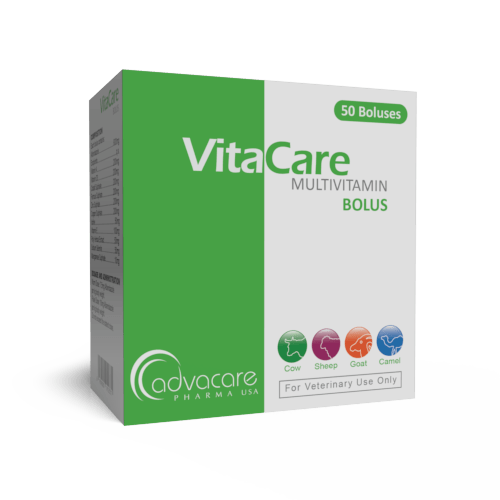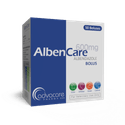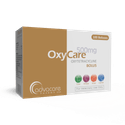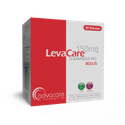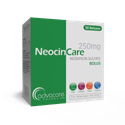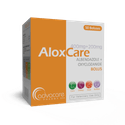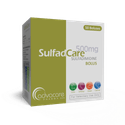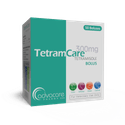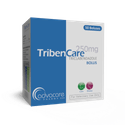- Home›
- Veterinary Pharmaceuticals›
- Veterinary Boluses›
- Multivitamin Boluses
Multivitamin Boluses
Dosage
Packaging
What is Multivitamin?
Active Ingredients: Vitamin A, Vitamin D3, Vitamin E, Vitamin B1, Vitamin K3, Vitamin C, Folic Acid, Biotin, Iron, Magnesium, Selenium, Copper:, Manganese, Cobalt, Calcium, Phosphorus
Multivitamin Boluses are supplements used to treat or prevent complications caused by stress or diseases like shipping fever or milk fever in camels, cows, goats, and sheep. As these issues may cause appetite loss and reduced milk output, it should be noted that the longer the animal doesn't eat, the greater the reduction in activity and output.
This supplement is intended to help an animal establish a stable, functioning gut flora and to provide vitamins, trace minerals, and electrolytes that have been lost or are deficient. Multivitamins exert a therapeutic effect by supplying essential vitamins that may be lacking in animals' diets. This aids in preventing nutrient deficiencies, which, if left unaddressed, can potentially result in serious health issues due to a weakened immune system. Vitamins play a crucial role in supporting cellular and tissue repair, as well as promoting optimal metabolic function.
AdvaCare is a GMP manufacturer of Multivitamin Boluses. It is important to note that this multivitamin formulation is for veterinary purposes only.
This supplement is also available in the form of tablets, multivitamin injection, and multivitamin soluble powder. The treatment choice depends on the veterinarian's choice and the animal's current health condition.
AdvaCare Pharma is a producer and distributor of Multivitamin Boluses. We offer a wide range of high-quality and cost-effective veterinary medicines that are available for exportation. This medicine is produced in our GMP-certified facilities in China, India, and the USA.
Why are we a top Multivitamin Bolus manufacturer?
AdvaCare Pharma is an American-owned and operated company specializing in the manufacture of veterinary medicines. As part of our range of 250+ veterinary formulations, we manufacture Multivitamin Boluses under strict GMP guidelines, ensuring efficacy. Our veterinary distributors have confidence in the quality of our products, making AdvaCare Pharma a leading bolus manufacturer and supplier to countries where dependable, cost-effective livestock medications are in high demand.
Uses
What is a Multivitamin used for?
It is used to treat or prevent nutritional deficiencies caused by many factors such as stress or diseases like milk fever and shipping fever.
What animals can be treated with Multivitamin Bolus?
It is recommended for livestock animals like camels, cows, ѕhеер, and gоаtѕ.
How do water-soluble vitamins (C, B1, B2, B3, B5, B6, and B12) help animals?
Vitamin B is found in diverse foods and plants, and Vitamin B12, primarily derived from animal-based sources, plays a pivotal role as a micronutrient supporting proper brain development and participating in one-carbon metabolism. It is vital for brain function, preventing central nervous system disorders, and addressing behavioral problems in animals, including stress. Vitamin B12 deficiency is characterized by myelopathy and neuropathy. The incorporation of this multivitamin premix into the diet can improve the animal's blood parameters and restore normal locomotor function.
The significance of Vitamin B extends to ensuring a healthy pregnancy and reducing the risk of neurodevelopmental issues in newborns. Supplementation with Vitamin B helps maintain docosahexaenoic acid (DHA) levels, a crucial factor in promoting typical neurological development in infants. Animals that maintain normal DHA levels during pregnancy tend to give birth to better-developed offspring.
How do fat-soluble vitamins (A, D3, K, and E) help animals?
Vitamin A plays a pivotal role in enhancing animal vision, supporting fetal growth, boosting immune function, aiding reproduction, and ensuring the integrity of mucosal barriers. The supplementation of vitamin A contributes to improved reproduction and coat quality in animals while also proving effective in the treatment of keratitis.
Vitamin D serves as a precursor for calcium, collectively enhancing the locomotor function of animals and preventing the development of soft and poorly formed bones in situations of insufficient calcium.
Vitamin E, known for its potent antioxidant properties, promotes normal immune function and maintains the integrity of cellular membranes. During pregnancy, it elevates colostrum vitamin E levels. Furthermore, vitamin E sustains regular reproductive capabilities in animals, fostering a normal estrus cycle in females and supporting typical reproductive abilities in males.
How can Zinc help animals?
Zinc is integral to facilitating normal energy production and metabolism. It plays a crucial role in supporting the immune system and reproductive health in animals. Additionally, zinc is crucial in maintaining healthy skin and fur, and it actively contributes to tissue and wound repair processes.
How can Magnesium help animals?
Magnesium leads to normal muscle function, contraction, and relaxation. It is involved in nerve function and regulates nerve impulses.
What are the benefits of Selenium in animals?
Sufficient selenium levels serve as a preventive measure against selenium deficiency and the accumulation of lipid hydroperoxides in organs and tissues. This contributes to enhanced pregnancy rates at the first service and a reduced time to conception. Selenium is effective in preventing abortions, stillbirths, and fetal heart failure. It also lowers the incidence of retained placenta, metritis, and ovarian cysts.
Furthermore, selenium exerts a positive influence on rumen microbial fermentation. When included in the diet, this supplement diminishes the likelihood of mastitis in animals by activating neutrophils phagocytically. It improves the immune response of the mammary gland through both humoral and cellular activities.
In males, selenium helps maintain the integrity of the sperm membrane and its fertilizing ability. It additionally enhances the quality of the male ejaculate.
Are Multivitamin Boluses enough for treating a certain disease?
This product is a supplement that can only improve the overall health of the animals. If the animal suffers from a viral disease, antiviral agents and many supplements are needed. In cases of bacterial infections, animals need antibiotics. This supplement can only shorten the healing process in animals. It will provide the animals with the proper nutrients. In case of nutritional deficiencies, this supplement can help the animals. If the animal has a serious metabolic disease, it will need more than supplements. Veterinarians usually prescribe all needed drugs and supplements in cases of nutritional deficiencies according to the specific needs of the animal.
Multivitamins alone cannot treat diseases; they can only aid in the overall health and wellness of the animals, and proper veterinary consultation is required for treating diseases.
How should Multivitamin Boluses be stored?
They should be stored in a dark, dry location below 25°C. Keep the boluses in the blister packs until usage.
Is there a withdrawal period after treatment with a Multivitamin Bolus?
The advised withdrawal period for meat after treatment with a Multivitamin Bolus is 28 days.
Dosage
How much Multivitamin should be given to livestock?
The usual dose is 1 bolus per 150kg of body weight. The bolus may be broken into smaller pieces for easier administration.
Refer to a veterinary doctor or pharmacist for guidelines on dosage.
Side Effects
When administered at the recommended dosage guidelines, Multivitamin Boluses cause few side effects. Supplements can cause various side effects in animals. Some more serious side effects may include:
- allergic reaction
- bloody diarrhea (due to an increase in vitamin B3)
- hypercalcemia
- muscle weakness or convulsions
- increased blood pressure
- hyperthyroidism
The primary concern related to vitamin supplementation is hypervitaminosis, and to mitigate this risk, strict adherence to recommended usage guidelines is crucial. Timely attention to symptoms of hypervitaminosis, particularly focusing on gastrointestinal issues such as vomiting, diarrhea, or constipation, is essential. Altered appetite, ranging from decreased to increased, may also manifest, especially with elevated doses of vitamin B.
While rare in veterinary medicine, allergic reactions demand immediate veterinary attention. Symptoms may include facial swelling, difficulty breathing, itching, rashes, and other skin issues.
Upon initiating vitamin supplementation, it is advisable to observe the animal for a few hours to detect any potential side effects, such as gastrointestinal changes, allergic reactions, or muscle weakness.
For a comprehensive understanding of all potential side effects associated with this medication, consulting a veterinarian is recommended.
Precautions
Do NOT use Multivitamin Boluses for animals with known allergies or hypersensitivity to any of the ingredients.
Strictly adhere to the veterinarian's recommended dosage to avoid the risk of accidental overdosing, which can occur easily. In case of accidental overdose, immediate management is crucial. Common indicators of overdosing include gastrointestinal symptoms such as diarrhea, constipation, or vomiting.
Excessive vitamin intake can adversely affect the nervous, cardiovascular, and gastrointestinal systems.
Maintain high standards of hygiene when administering this supplement. If a dose is missed, do not compensate with double doses.
Prior to introducing any supplement, particularly if the animal has existing health issues, consult a veterinarian. Conduct blood tests and urinalysis before initiating supplementation.
Ensure that the product is stored out of reach of children or farm visitors.
Despite being a vitamin supplement, owners and farmers should be mindful of potential negative consequences associated with overusing vitamins. Overdosing can lead to hypervitaminosis and various health issues if not properly addressed and managed.
What are the most common animals for which Multivitamin Boluses are used?
Multivitamin Boluses are primarily used to treat the following health issues in cows, sheep, and goats:
- Stress
- Nutritional deficiencies
- Degenerative myelopathy
- Avitaminosis
- Osteomalacia
- Tetany
- Keratitis
Cow Vitamin Supplementation
In cows, this Multivitamin Bolus can be given as a daily supplement. It is mostly used for treating metabolic disorders, avitaminosis, osteomalacia, tetany, etc.
Sheep Vitamin Supplementation
In sheep, it can be given as a daily supplement or it can be used for treating metabolic disorders, keratitis, avitaminosis, nutritional deficiencies, and stress.
Goat Vitamin Supplementation
In goats, it can be given as a daily supplement or it can be used for treating metabolic disorders, avitaminosis, nutritional deficiencies, and stress.
This supplement can be administered on a daily and regular basis to uphold a balanced diet in animals. Multivitamins are particularly beneficial during pregnancies, as they contribute to maintaining a normal pregnancy and result in the birth of normally developed newborns.

You might be interested in...
Why AdvaCare Pharma?
As an industry leader, we are aware of our responsibility to provide affordable and sustainable solutions to improve healthcare worldwide.
